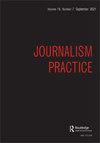技术与信息验证的相关性:挪威新闻在全国选举期间的见解
IF 2
2区 文学
Q2 COMMUNICATION
引用次数: 0
摘要
对虚假信息日益增长的担忧促使人们开发了新的数字工具和系统,以满足记者的核实和事实核查需求。尽管有这些技术发展,但研究表明,新兴技术并没有像行业描述的那样经常被利用,也没有得到那么高的重视。有迹象表明,与数字技术技能相比,典型的记者更看重写作和采访等传统技能,许多记者并不认为这些新工具在日常工作中非常有用。本文采用社会技术方法来研究记者、技术、组织和专业惯例之间的相互作用。具体来说,我们检查记者使用验证技术来检测虚假信息在选举期间。我们的研究结果显示,所谓的新技术潜力与新闻工作和事实核查的日常实践之间存在差异——在数字先进的挪威媒体行业也是如此。我们发现,在新闻编辑室中,既有惯例和文化之间存在紧张关系,新闻方法更新的推动力可以分为两个标题:策略与实践,距离与节拍和来源的距离与距离。本文章由计算机程序翻译,如有差异,请以英文原文为准。
The Relevance of Technology to Information Verification: Insights from Norwegian Journalism During a National Election
Growing concerns about disinformation have led to the development of new digital tools and systems designed for journalists’ verification and fact-checking needs. Despite these technological developments, research has demonstrated that emerging technologies are not utilised as often and are not as highly valued as industry narratives suggest. There are indications that the typical journalist values traditional skills such as writing and interviewing higher than digital technology skills and that many journalists do not consider the new tools to be very useful in their everyday work. This article takes on a sociotechnical approach to study the interplay between journalists, technology, organisational and professional routines. Specifically, we examine journalists’ use of verification technologies to detect disinformation during an election period. Our findings show a discrepancy between the alleged potential of new technologies and the everyday practices of newswork and fact-checking – also in the digitally advanced Norwegian media industry. We found tensions between established routines and cultures in the newsroom and the push for the renewal of journalistic methods which can be sorted under two headings: strategy vs. practice and proximity vs. distance to the beat and sources.
求助全文
通过发布文献求助,成功后即可免费获取论文全文。
去求助
来源期刊

Journalism Practice
COMMUNICATION-
CiteScore
5.50
自引率
14.30%
发文量
111
期刊介绍:
ournalism Practice provides opportunities for reflective, critical and research-based studies focused on the professional practice of journalism. The emphasis on journalism practice does not imply any false or intellectually disabling disconnect between theory and practice, but simply an assertion that Journalism Practice’s primary concern is to analyse and explore issues of practice and professional relevance. Journalism Practice is an intellectually rigorous journal with all contributions being refereed anonymously by acknowledged international experts in the field. An intellectually lively, but professionally experienced, Editorial Board with a wide-ranging experience of journalism practice advises and supports the Editor. Journalism Practice is devoted to: the study and analysis of significant issues arising from journalism as a field of professional practice; relevant developments in journalism training and education, as well as the construction of a reflective curriculum for journalism; analysis of journalism practice across the distinctive but converging media platforms of magazines, newspapers, online, radio and television; and the provision of a public space for practice-led, scholarly contributions from journalists as well as academics. Journalism Practice’s ambitious scope includes: the history of journalism practice; the professional practice of journalism; journalism training and education; journalism practice and new technology; journalism practice and ethics; and journalism practice and policy.
 求助内容:
求助内容: 应助结果提醒方式:
应助结果提醒方式:


